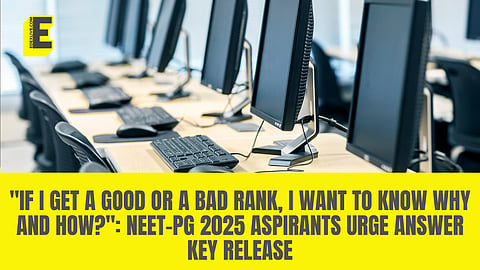

“What sort of democracy are we living in?”
That’s the question posed by Dr Dhruv Chauhan, a medical activist, whose recent tweet has once again ignited the conversation around the lack of transparency in India’s NEET PG examination process.
This year, over two lakh doctors are set to appear for the highly competitive postgraduate entrance test. Yet, despite repeated demands, the issues that plagued the exam last year, particularly double shift scheduling, unexplained normalisation methods, and the non-release of answer keys, remain unresolved.
In a tweet that has resonated widely with aspirants, Dr Chauhan wrote:
Last year’s exam saw aspirants from the second shift reporting a noticeably tougher paper. With no official release of the answer key or a transparent breakdown of how scores are normalised, students were left in the dark.
This year, the concern is that history might repeat itself without explanation or accountability.
The missing answer key!
One of the most persistent and widely supported demands has been the release of answer keys and response sheets, a practice followed in most state and national-level exams. Aspirants argue that this basic transparency measure would help them evaluate their performance fairly and prepare future batches better.
Dr Dimple, a NEET PG aspirant, expressed her frustration: “In exams like NEET PG where lives and careers are at stake, it’s not at all fair for the authorities to not release the answer key. I recently appeared for the Gujarat Public Service Commission (GPSC) exam. They published our own OMR sheets on the official website, along with the answer key and a window to submit objections.”
She points out that NEET PG, being a computer-based exam, should have even fewer logistical barriers to releasing this data; however, with lost hope, she said, “They are not listening to anyone, they are not conducting the exam in one shift, they are not being transparent. I don’t understand what is all of this”
Beyond individual grievances, she highlights how answer keys help upcoming aspirants as well: “If we know what the accepted answer is, it eliminates confusion for certain topics. Right now, PYQs (Previous Year Questions) are based on memory, not accuracy.”
A matter of sources and standards
Authorities have often remained tight-lipped on the reason behind withholding answer keys, but some aspirants believe it stems from a fear of disputes, especially over controversial questions.
Dr Nidhish, another NEET PG hopeful, explains, “Authorities are usually worried about controversial questions, where different books give different answers. If you’re worried about that, then give us a set of books that you think are correct. Tell us what source you are using.”
His argument is not to create controversy but to encourage clarity and prevent future confusion, “Answer keys are essential for transparency. Most exams across India release them. It clears doubts and makes the process fair,” he says.
Trust deficit: More than just marks
But it’s not just about knowing the correct answers — it’s also about knowing where one went wrong. Aspirants say the lack of information builds distrust in the entire process.
Dr Kunj Patel, who will be attempting the exam in two months, shared:
“Whether I get a good rank or a bad one, I’d like to know how I performed, where I lagged, and where I did well. Every year, one shift is claimed to be harder, but how is that comparison made? How is this normalisation done?” he questioned.
He says the absence of transparency feeds suspicion, especially in a system where fairness can’t just be promised, it must be shown. He points out, “If transparency is not provided, we always think something is wrong, something is fishy. That’s not our fault; it's what we see around us.”
Despite his doubts, Dr Patel is pragmatic, “I don’t hope much. Authorities don’t listen. So, why waste time? But we do have the Right to Information, and this is the information we need.”
With NEET PG 2025 approaching, aspirants say it's not too late for authorities to restore faith in the system. A simple act releasing the answer key and score calculation methodology could go a long way in addressing their concerns.
